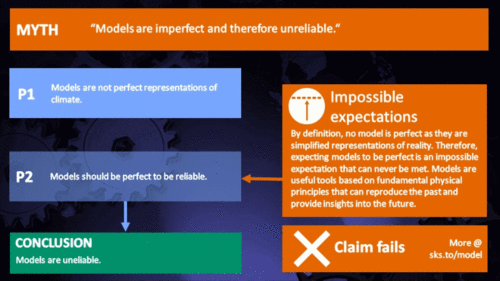 Arguments
Arguments
 Software
Software
 Resources
Comments
Resources
Comments
 The Consensus Project
The Consensus Project
 Translations
Translations
 About
Support
About
Support


Latest Posts
- Sea otters are California’s climate heroes
- 2026 SkS Weekly Climate Change & Global Warming News Roundup #06
- Skeptical Science New Research for Week #6 2026
- The future of NCAR remains highly uncertain
- Fact brief - Can solar projects improve biodiversity?
- How the polar vortex and warm ocean intensified a major US winter storm
- 2026 SkS Weekly Climate Change & Global Warming News Roundup #05
- Help needed to get translations prepared for our website relaunch!
- Skeptical Science New Research for Week #5 2026
- Climate Variability Emerges as Both Risk and Opportunity for the Global Energy Transition
- Fact brief - Are solar projects hurting farmers and rural communities?
- Winter 2025-26 (finally) hits the U.S. with a vengeance
- 2026 SkS Weekly Climate Change & Global Warming News Roundup #04
- Skeptical Science New Research for Week #4 2026
- WMO confirms 2025 was one of warmest years on record
- Fact brief - Do solar panels release more emissions than burning fossil fuels?
- Keep it in the ground?
- 2026 SkS Weekly Climate Change & Global Warming News Roundup #03
- Skeptical Science New Research for Week #3 2026
- Climate Adam - Will 2026 Be The Hottest Year Ever Recorded?
- Fact brief - Does clearing trees for solar panels release more CO2 than the solar panels would prevent?
- Where things stand on climate change in 2026
- 2026 SkS Weekly Climate Change & Global Warming News Roundup #02
- Skeptical Science New Research for Week #2 2026
- UK renewables enjoy record year in 2025 – but gas power still rises
- Six climate stories that inspired us in 2025
- How to steer EVs towards the road of ‘mass adoption’
- 2026 SkS Weekly Climate Change & Global Warming News Roundup #01
- Skeptical Science New Research for Week #1 2026
- 2025 in review - busy in the boiler room
Myth Deconstruction - Model (EN)

Reference
Deconstructing climate misinformation to identify reasoning errors
Cook, J., Ellerton, P., & Kinkead, D. (2018). Deconstructing climate misinformation to identify reasoning errors. Environmental Research Letters, 13(2), 024018. Link to PDF & Link to Supplement
Step-by-step deconstruction
The table below is inspired by the simplified supplement and may differ slightly from what is shown in the GIF. This is mostly due to make the text fit into the available space which made it necessary to reword some of it.
| 1 | Identify claim | Models are imperfect and therefore unreliable. |
| 2 | Argument structure | Premise 1: Models are not perfect representations of climate. Conclusion: Models are unreliable. |
| 3 | Inferential Intent |
Deduction |
| 4 | Validity | INVALID Non sequitur: mistakes made have no bearing on the broader results from models which are based on fundamental physics. In addition our understanding is based on empirical evidence also. |
| 4a | Hidden premises | Premise 1: Models are not perfect representations of climate Premise 2: Models should be perfect to be reliable. Conclusion: Models are unreliable. |
| 5 | Check premises | Premise 1 is true, although there is a hint of slothful induction in that it ignores all the correct interpretations that models have made. Premise 2 is false. Impossible expectations. no model is perfect but they are useful tools that can reproduce the past and provide insights into the future. |
| 6 | Status of claim | FALSE The argument is made valid with an extra premise but the premise is false. |
| 7 | Summary of fallacies | Impossible expectations: By definition, no model is perfect as they are simplified representations of reality. Therefore, expecting models to be perfect is an impossible expectation that can never be met. Models are useful tools based on fundamental physical principles that can reproduce the past and provide insights into the future. |
Related material
How reliable are climate models?
Blog post with background information about the myth deconstructions: Myth deconstructions as animated gifs
To learn more about the fallacies used in the myth deconstructions: A history of FLICC: the 5 techniques of science denial
Other versions
Printable Version | Back to Graphics by Skeptical Science
|
|
Skeptical Science Graphics by Skeptical Science is licensed under a Creative Commons Attribution 4.0 International License. |
THE ESCALATOR

(free to republish)
























































